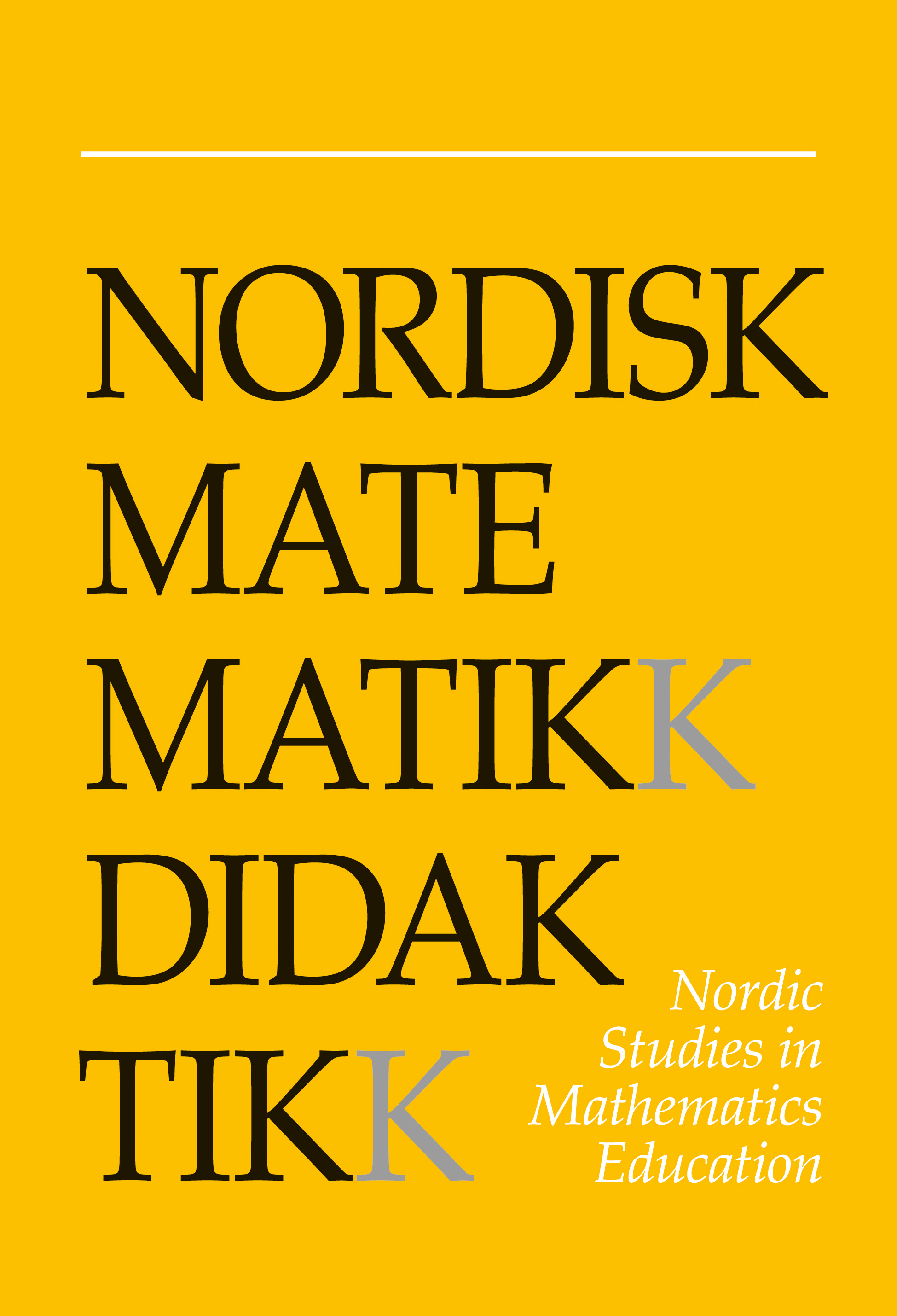'Informal activity' in mathematics instruction
DOI:
https://doi.org/10.7146/nomad.v2i3-4.146129Abstract
On the basis of an analysis of portions of a modelling course in Danish high school, the existence of 'informal activity' is asserted. This activity can contain reflections on the mathematical activity performed when 'on task', but also allows the students to distance themselves from the content and school-tasks in gene- ral. Informal activity may thereby contain a potential for critique which is not rea- lized due to isolation in the informal activity. To give insight on the possibility for change, the formation of discourses and their relation to the setting is discussed.
References
Austin, J. L. (1958), Performative-Constative. In J. R. Searle (Ed.), The Philosophy of Language. Oxford, UK: Oxford University Press.
Austin, J. L. (1961/70). Philosophical Papers. Oxford, UK: Oxford University Press. Bekendtgørelse (1990). nr. 207. Bekendtgørelse om fagene m.v. i gymnasiet (Directive no. 207: Directive concerning the subjects etc. in the gymnasium), j . nr. 21240-90 (Record no. 21240-90). Copenhagen, Denmark: Undervisnings- og Forskningsminis- teriet, DGHF (The Ministry of Education and Research, The Directorate for the Gym- nasium and the Higher Preparatory Courses).
Brousseau, G. (1984). The Crucial Role of the Didactical Contract in the Analysis and Construction of Situations in Teaching and Learning Mathematics. In H-G. Steiner et al. (Eds.), Theory of mathematics education (TME), ICME 5, Topic area and minicon- ference. Occasional paper no. 54, Institut für Didaktik der Mathematik der Universität Bielefeld, Bielefeld, Germany, pp. 110-119.
Christiansen, I. M. (1994). Classroom Interactions in Applied Mathematics Courses: Case Studies in Danish High School. PhD-thesis from Aalborg University, Text no. R-94- 2045a.
Ensor, P. (1993). Plenary Response to Nick Taylor. In C. Julie, D. Angelis, & Z. Davis (Eds.), Political Dimensions of Mathematics Education 2: Curriculum Reconstruction for Society in Transition. Proceedings from the Second International Conference on the Political Dimensions of Mathematics Education, National Education Coordinating Committee (NECC). Cape Town, South Africa: Mathematics Commission, Maskew Miller Longman, pp. 138-139.
Foucault, M. (1972). The Archaeology of Knowledge. London, UK: Tavistock. (Originally published in French under the title L'Archéologie du Savoir by Editions Gallimard, 1969).
Foucault, M. (1984). Power/Knowledge. Brighton: The Harwester Press.
Jensen, J. F., & Lytje, I. (1993). Om tegn og data. In J. F. Jensen, I. Lytje, & P. Øhrstrøm (Eds.), Tegn & Data. FTSK-serien 2 (Forskning i Informatik, Semiotik & Kulturanalyse [Research in Informatics, Semiotics, and Culture Analysis]). Aalborg, Denmark: Aalborg Universitetsforlag, pp. 9-24.
Jungwirth, H. (1991). The Real World behind Real-world Problems - some findings of a micro-ethnographical study. In M. Niss, W. Blum & I. Huntley (Eds.), Teaching of Mathematical Modelling and Applications. London, UK: Ellis Horwood, pp. 93-102.
McDermott, R. P. (1993). Acquisition of a Child by a Learning Disability. In S. Chaiklin & J. Lave (Eds.), Understanding Practice: Perspectives on activity and context. Cambridge, UK: Cambridge University Press. https://doi.org/10.1017/CBO9780511625510.011
Mellin-Olsen, S. (1991). Hvordan tenker lærere om matematikkundervisning? Landås, Norway: Bergen Lærerhøgskole.
Mellin-Olsen, S. (1992). Tekster om Sosialisering: Til bruk på nordisk forskningsseminar f or fagdidaktikk matematikk. [A short introduction to a collection of texts on socializa- tion distributed to a seminar on this topic]. Bergen, Norway: Institutt for Praktisk Pedagogikk, Universitetet i Bergen.
Ochs, E. (1990). Indexicality and Socialization. In J.W. Stigler, R.A. Shweder, & G. Herdt (Eds.), Cultural Psychology: Essays on Comparative Human Development, Cambridge, UK: Cambridge University Press, pp. 287-308. https://doi.org/10.1017/CBO9781139173728.009
Undervisningsministeriet (1994). Danish Ministry of Education, Department of Upper Secondary Education [Undervisningsministeriet, Gymnasieafdeling]: The Danish Gymnasium - General Rules and the Subjects: Executive Order on The Upper-Secondary School Upper-Secondary Level Courses and the Single Subject Upper-Secondary Examination. Copenhagen, Denmark: Author.
Voigt, J. (1985). Patterns and Routines in Classroom Interaction. Recherches en Didactique des Mathématique 6(1), pp. 69-118.
Wyndhamn, J. (1993). Problem-solving Revisited: On school mathematics as a situated practice. Linköping Studies in Arts and Science 98. Linköping, Sweden: Department of Communication Studies, Linköping University (PhD-thesis).
Downloads
Published
How to Cite
Issue
Section
License

This work is licensed under a Creative Commons Attribution-NonCommercial-ShareAlike 4.0 International License.



